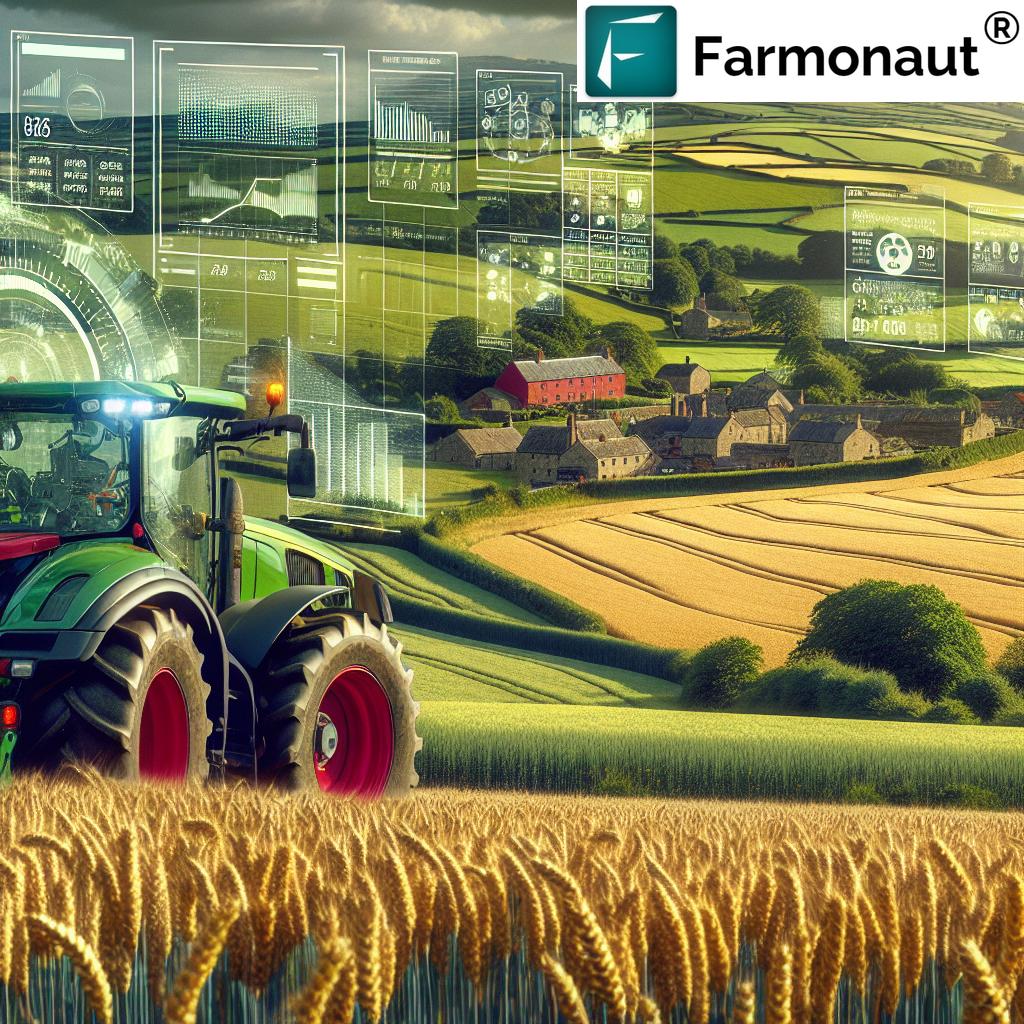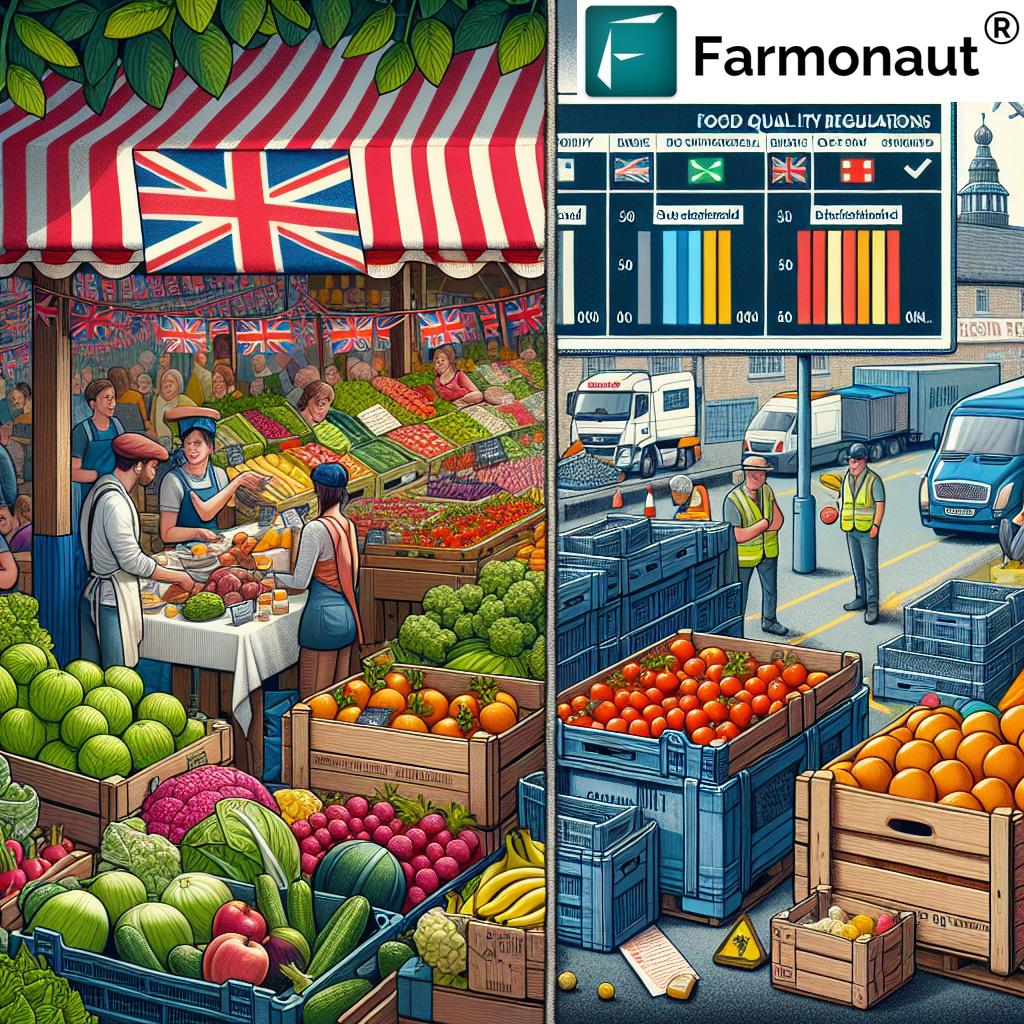UK Farming Revolution: High Tariffs on Sub-Standard Food Imports to Protect British Agriculture
“Post-Brexit UK agricultural policy changes aim to protect 71% of UK’s total land area used for farming.”
In a bold move to safeguard the UK agricultural industry, the government has proposed implementing high tariffs on sub-standard food imports. This initiative marks a significant shift in the country’s approach to food security and farm support measures, aiming to create a level playing field for domestic producers while maintaining stringent food quality regulations. As we delve into this transformative policy, we’ll explore its implications for British farming standards, the agricultural market, and the future of farming in the UK.
The Changing Landscape of UK Agriculture
The UK agricultural industry is facing unprecedented changes in the wake of Brexit. As we navigate this new era, it’s crucial to understand the evolving dynamics of our farming sector. From arable and dairy farming to livestock management, every aspect of agriculture is undergoing transformation.
- Brexit impact on agriculture
- Shift in agricultural policy
- Focus on sustainable farming practices
These changes are reshaping the way we approach farming, with a renewed emphasis on supporting local farmers and promoting environmentally friendly practices. Let’s take a closer look at how the proposed tariffs fit into this broader picture.
Understanding the New Tariff Proposal
The UK government’s proposal to impose high tariffs on sub-standard food imports is a cornerstone of its strategy to protect British farming standards. This move is designed to ensure that imported foods meet the same rigorous quality and safety standards that UK farmers are required to uphold.
“The UK government’s new tariff proposal could affect up to £200 billion worth of food imports annually.”
Key aspects of the proposal include:
- Implementing stricter quality controls on imported food products
- Raising tariffs on imports that don’t meet UK standards
- Creating a more competitive environment for domestic producers
This policy shift is expected to have far-reaching consequences for both farmers and consumers across England, Scotland, Wales, and Northern Ireland.
Impact on British Farming Standards
The introduction of high tariffs on sub-standard food imports is set to reinforce British farming standards. By creating a barrier for products that don’t meet our rigorous quality requirements, we’re ensuring that UK farmers are not unfairly disadvantaged by cheaper, lower-quality imports.
Benefits for British farmers include:
- Protection against unfair competition
- Incentive to maintain high production standards
- Potential for increased market share in domestic food supply
This move aligns with the UK’s commitment to maintaining some of the highest food safety and animal welfare standards in the world. It also supports the government’s broader objectives of promoting sustainable farming practices and reducing the carbon footprint of our food supply chain.

Agricultural Market Fluctuations and Adaptation
The implementation of new tariffs is likely to cause significant fluctuations in the agricultural market. Farmers and agribusinesses will need to adapt to these changes to remain competitive. Here’s how different sectors might be affected:
- Arable farming: Potential increase in demand for domestically grown crops
- Dairy industry: Greater protection against cheaper foreign imports
- Livestock farming: Enhanced opportunities for British meat producers
- Fruit and vegetable growers: Possible expansion of market share in domestic supply
To navigate these market changes effectively, farmers may need to invest in new technologies and farming equipment. This is where innovative solutions like those offered by Farmonaut can play a crucial role.
Learn more about how Farmonaut’s advanced satellite-based farm management solutions can help you adapt to market changes: Farmonaut Web App
Climate Change and Agriculture: A Double Challenge
While the new tariff policy aims to protect British agriculture, farmers still face the ongoing challenge of climate change. The agricultural sector must adapt to changing weather patterns, increased frequency of extreme events, and shifts in growing seasons.
Key climate-related challenges for UK agriculture include:
- Unpredictable rainfall patterns affecting crop yields
- Rising temperatures impacting livestock health and productivity
- Increased risk of pests and diseases
- Need for more resilient crop varieties and farming practices
To address these challenges, many farmers are turning to precision agriculture technologies. These tools can help optimize resource use, improve crop management, and increase overall farm resilience.
UK Farm Support Measures in the Post-Brexit Era
As part of the broader agricultural policy changes post-Brexit, the UK government is implementing new farm support measures. These are designed to help farmers transition to more sustainable practices while maintaining productivity and profitability.
Key elements of the new support system include:
- Environmental Land Management schemes
- Grants for equipment and technology upgrades
- Support for farm diversification initiatives
- Incentives for carbon sequestration and biodiversity enhancement
These measures, combined with the protective tariffs, aim to create a more resilient and sustainable UK farming sector.
The Role of Technology in Modern Farming
As the agricultural landscape evolves, technology is playing an increasingly important role in farm management. From precision agriculture to AI-driven analytics, farmers have access to a wide range of tools to optimize their operations.
Farmonaut’s satellite-based crop health monitoring system is at the forefront of this technological revolution. Our platform provides real-time insights into crop health, soil moisture levels, and other critical metrics, helping farmers make informed decisions about irrigation, fertilizer usage, and pest management.
Key benefits of adopting agricultural technology include:
- Improved resource efficiency
- Enhanced crop yields
- Better pest and disease management
- Reduced environmental impact
Explore how Farmonaut’s technology can transform your farming practices: Download Farmonaut Android App | Download Farmonaut iOS App

Sustainable Farming Practices: A Priority for UK Agriculture
The focus on sustainable farming practices is a key component of the UK’s agricultural policy. This approach not only helps protect the environment but also ensures the long-term viability of farming businesses.
Sustainable farming practices being promoted include:
- Regenerative agriculture techniques
- Organic farming methods
- Agroforestry and integrated farming systems
- Precision agriculture for optimized resource use
By adopting these practices, farmers can reduce their environmental impact while potentially increasing profitability through improved efficiency and access to premium markets.
The Impact on Different Farming Enterprises
The new tariff policy and associated agricultural changes will impact various farming enterprises differently. Let’s explore how some key sectors might be affected:
Arable Farming
Arable farmers may see increased demand for domestically grown crops, particularly if imports become more expensive. This could lead to opportunities for expansion and diversification of crop types.
Dairy Farming
The dairy industry could benefit from greater protection against cheaper foreign imports, potentially stabilizing milk prices and creating a more secure market for UK dairy products.
Livestock Farming
Cattle and sheep farmers might experience enhanced opportunities as the market for British meat strengthens. However, they’ll need to maintain high animal welfare standards to meet consumer expectations.
Grassland Management
With a potential increase in livestock farming, effective grassland management will become even more crucial. Farmers may need to invest in advanced technologies for optimal pasture utilization.
Farmonaut’s satellite-based monitoring can assist in efficient grassland management. Learn more about our services: Farmonaut API
Adapting Your Agricultural Business
As the agricultural landscape evolves, farmers and agribusinesses need to adapt to remain competitive. Here are some strategies to consider:
- Invest in modern farming equipment and machinery
- Adopt precision agriculture techniques
- Explore diversification opportunities
- Focus on producing high-quality, premium products
- Implement sustainable farming practices
By embracing these strategies, farmers can position themselves to thrive in the changing agricultural environment.
The Role of Technology in Navigating Changes
Technology plays a crucial role in helping farmers navigate the changing agricultural landscape. Advanced tools and platforms can provide valuable insights and improve decision-making processes.
Farmonaut’s Jeevn AI Advisory System is an excellent example of how technology can support farmers. This AI-driven tool delivers real-time insights, weather forecasts, and expert crop management strategies, helping farmers optimize their operations and adapt to changing conditions.
Key technological advancements benefiting farmers include:
- Satellite-based crop monitoring
- AI-driven advisory systems
- Precision agriculture tools
- Blockchain-based traceability solutions
Explore how Farmonaut’s technology can benefit your farm: Farmonaut API Developer Docs
Comparison of UK Food Import Standards and Tariffs
| Food Category | Current Standards | Proposed Standards | Estimated Tariff Increase |
|---|---|---|---|
| Meat | Basic animal welfare and hygiene standards | Enhanced animal welfare, antibiotic use restrictions | 30-40% |
| Dairy | Standard pasteurization and quality checks | Stricter quality controls, enhanced traceability | 25-35% |
| Fruits and Vegetables | Basic pesticide residue limits | Lower pesticide limits, increased organic standards | 20-30% |
| Grains | Standard quality and moisture content checks | Enhanced mycotoxin testing, GMO regulations | 15-25% |
The Future of UK Agriculture
As we look to the future of UK agriculture, it’s clear that the sector is entering a period of significant transformation. The combination of new tariff policies, focus on sustainability, and technological advancements is reshaping the industry.
Key trends shaping the future of UK farming include:
- Increased emphasis on food security and self-sufficiency
- Growing adoption of precision agriculture techniques
- Rise of vertical farming and urban agriculture
- Integration of AI and machine learning in farm management
- Development of climate-resilient crop varieties
By staying informed about these trends and adapting accordingly, UK farmers can position themselves for success in this evolving landscape.
Conclusion
The UK’s agricultural revolution, marked by high tariffs on sub-standard food imports, represents a significant shift in the country’s approach to farming and food security. While challenges remain, this policy change, combined with technological advancements and a focus on sustainability, offers exciting opportunities for British farmers.
As we navigate this new era, tools like Farmonaut’s satellite-based farm management solutions will play a crucial role in helping farmers adapt and thrive. By embracing innovation, sustainability, and quality, the UK agricultural industry is poised to enter a new era of prosperity and resilience.
Ready to revolutionize your farming practices? Explore Farmonaut’s advanced agricultural solutions today:
Frequently Asked Questions
- How will the new tariffs affect food prices for consumers?
While there may be some initial price increases, the policy aims to ensure long-term food security and quality. Consumers can expect access to high-quality, locally produced food. - What support is available for farmers adapting to these changes?
The government is offering various support measures, including grants for equipment upgrades and environmental land management schemes. - How can technology help farmers navigate these changes?
Technologies like Farmonaut’s satellite-based monitoring can help farmers optimize their operations, improve crop yields, and adapt to changing market conditions. - Will these changes affect the UK’s trade relationships?
While there may be some adjustments in trade dynamics, the policy aims to create fairer competition and maintain high food standards in international trade. - How does this policy align with sustainable farming practices?
The policy encourages sustainable farming by promoting high-quality, locally produced food and incentivizing environmentally friendly farming practices.






